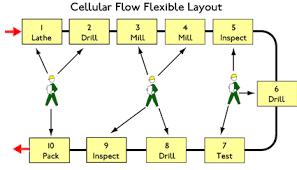Question 4 - Industrial + commercial practice
0.0(0)
0.0(0)
Card Sorting
1/16
Earn XP
Description and Tags
Study Analytics
Name | Mastery | Learn | Test | Matching | Spaced | Call with Kai |
|---|
No study sessions yet.
17 Terms
1
New cards
3 scales of production
* one-off - producing a single product
* batch - made in a specific quantity
* mass/continuous - made in large quantities usually 24/7, are in high demand
* batch - made in a specific quantity
* mass/continuous - made in large quantities usually 24/7, are in high demand
2
New cards
advantages of one-off production
* unique product
* answers exact customer needs and wants
* answers exact customer needs and wants
3
New cards
disadvantages of one-off production
* highly skilled workers required
* individually designed so more expensive
* company needs to be flexible to adapt to jobs
* individually designed so more expensive
* company needs to be flexible to adapt to jobs
4
New cards
examples of one-off products
* clothing for certain celebs
* personalised/custom sneakers
* personalised/custom sneakers
5
New cards
advantages of batch production
* end product will be cheaper to sell than process of production
* good for when an item goes out of fashion or sells poorly
* good for when an item goes out of fashion or sells poorly
6
New cards
disadvantages of batch production
* expensive to set up production lines and equipment
* production line needs to be flexible
* initial set up can be expensive
* production line needs to be flexible
* initial set up can be expensive
7
New cards
examples of batch products
* limited edition products
* electronic products
* electronic products
8
New cards
advantages of mass/continuous production
* products usually are simplistic and don’t require too many components to assemble
* end product is usually cheap
* labour costs are cheap, not many skilled workers required
* end product is usually cheap
* labour costs are cheap, not many skilled workers required
9
New cards
disadvantages of mass/continuous production
* initial set up is very expensive
* quality control issues need to be in place
* quality control issues need to be in place
10
New cards
examples of mass/continuous production
* food products
11
New cards
JIT manufacturing
* just in time, sometimes known as LEAN manufacturing
* aims to reduce flow times within production system and response times from suppliers and to customers
* focuses on efficient use of time and storing small amounts of stock/components
* no warehouse or storage
* aims to reduce flow times within production system and response times from suppliers and to customers
* focuses on efficient use of time and storing small amounts of stock/components
* no warehouse or storage
12
New cards
advantages of JIT manufacturing
* reduces waste
* no warehouse thus lower costs
* reduces time
* no warehouse thus lower costs
* reduces time
13
New cards
disadvantages of JIT manufacturing
* very sensitive to any type of error
* will not be able to adapt to sudden increase in demand
* will not be able to adapt to sudden increase in demand
14
New cards
examples of JIT manufacturing
* car manufacturers
15
New cards
modular/cell production
* horse-shoe shaped
* involves a team of workers to finish a product
* workers can move around, makes them more skilled, less monotonous
* different cells for different parts of product
* involves a team of workers to finish a product
* workers can move around, makes them more skilled, less monotonous
* different cells for different parts of product

16
New cards
quality assurance
* ensuring issues don’t happen before production
* e.g. using trained staff, high quality tools
* e.g. using trained staff, high quality tools
17
New cards
quality control
* ensuring issues don’t happen during production
* e.g. checking product over production
* e.g. checking product over production